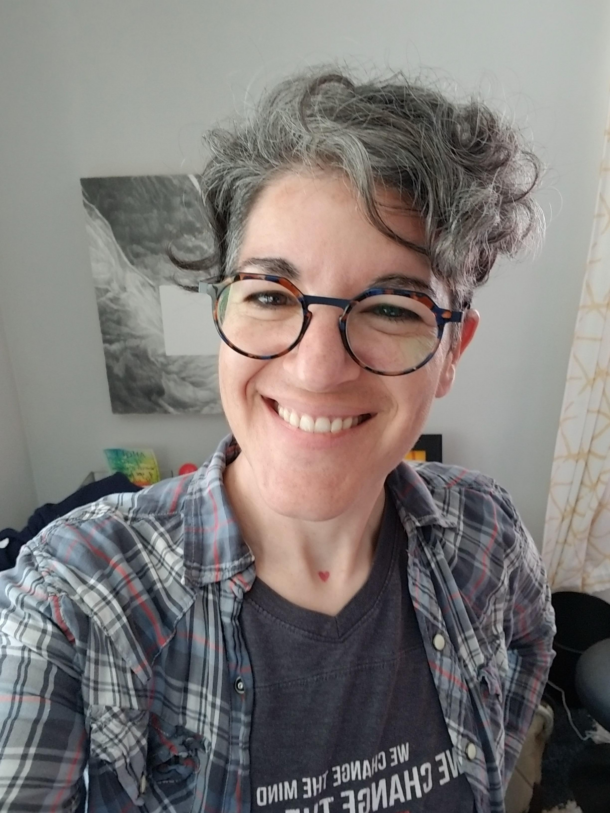I keep thinking about grief.
I keep thinking about grief and rituals.
I keep thinking about grief and rituals and how little space we have in our cultures and daily lives for grief.
I wasn’t familiar with the musician Andy Grammer until one of my feel-good newsletters shared this video of him talking about how he proactively engages with the grief stemming from his mom’s death:
Is buying random strangers who are around his mom’s age when she died a ritual?
Not the kind that you’d find in a religious text but…
…it is something he does with intentionality and thoughtfulness, as a way to stir the sorrow within him, a way to connect with others through this universal experience of grief, a way to honor his mom…
Then yes, a ritual.
A modern ritual of remembrance and experiencing.
A modern ritual of engaging more fully with the unique (to each individual, in each instance) and utterly normal (to all living things) thing that is grief… that is loss.
In my life, I’ve often experienced ritual as the thing we do because that’s what we do rather than what this is, a thing Grammer does because grief stirs him to do something and this is the thing that came to him.
In my life, I’ve often experienced people – myself included – navigate engagement with that which causes grief rather than navigating grief itself.
In my hardest moments, I’ve watched people break eye-contact, abruptly interrupt a sentence, or distance themselves because the grief I carried was too much for them to witness.
This isn’t a complaint; it’s an observation of how atrophied our muscles of holding this particular space – for ourselves and for one another.
At the end of our All Up in It conversation, coach Jennifer O’Grady said that we are so unskilled at allowing ourselves to be witnessed that we then have poor skills for witnessing others.
I want to exercise these muscles – the being witnessed and the witnessing.
The grieving and the being with others’ grief.
Friends, there is so much to grieve.
I’m not just thinking about those in my life coping with fresh or impending deaths, though I am thinking about them.
I’m not just thinking about those whose standard-issue outsides are wrapped around innards carrying life-threatening glitches, whether physiological or psychological, though I am thinking about them.
I’m not just thinking about the civilians in Israel and Palestine, Ukraine and Russia, Myanmar/Burma, and all the many other places where atrocity is being called by the tidier name of “war,” though I am thinking about them.
I’m also thinking about the comparatively-diminutive sources of grief…
…the path-not-taken grief…
…the what-could-have-been grief…
…the did-my-best-and-it-still-went-sideways grief…
The grief – by which I mean the anger/sadness/fear/emptiness/guilt/shame/doubt/wistfulness/disappointment/etc – of being alive and human and bearing the wonderful burden of our thinking minds and our communicative emotions and our ever-responsive often-reactive nervous systems.
But how to be with the omnipresent grief that is, as Valarie Kaur says, “the price of love”?
Raised as a woman, I was taught to feed grief.
Raised as an American, I was taught to lower a flag to half staff to honor grief.
Raised as a Jew, I was taught to engage deeply with grief for a time and then systemically withdraw until the year is 354 days of living and 1 day of grief.
Let me not do you the disservice of taking Kaur’s words out of context, though, because it’s the rest of the paragraph that offers the guidance:
“Love” is more than a feeling. Love is a form of sweet labor: fierce, bloody, imperfect, and life-giving – a choice we make over and over again. If love is a sweet labor, love can be taught, modeled, and practiced. This labor engaged all our emotions. Joy is the gift of love. Grief is the price of love. Anger protects that which is loved. And when we think we have reached our limit, wonder is the act that returns us to love.
Andy Grammer seems to understanding this with his gifted meals and lingering hugs with strangers.
And you, friend?
How might you create ritual to honor and express your own grief?
How might that ritual open you up to revolutionary love?
Me, I’m still figuring it out, always…
…always tinkering with ritual…
…always starting with connection because you – the individual that is you and also the big You of existence – help me stay rooted in the beauty and potential of love.
I hope I do that for you, too, friend.
